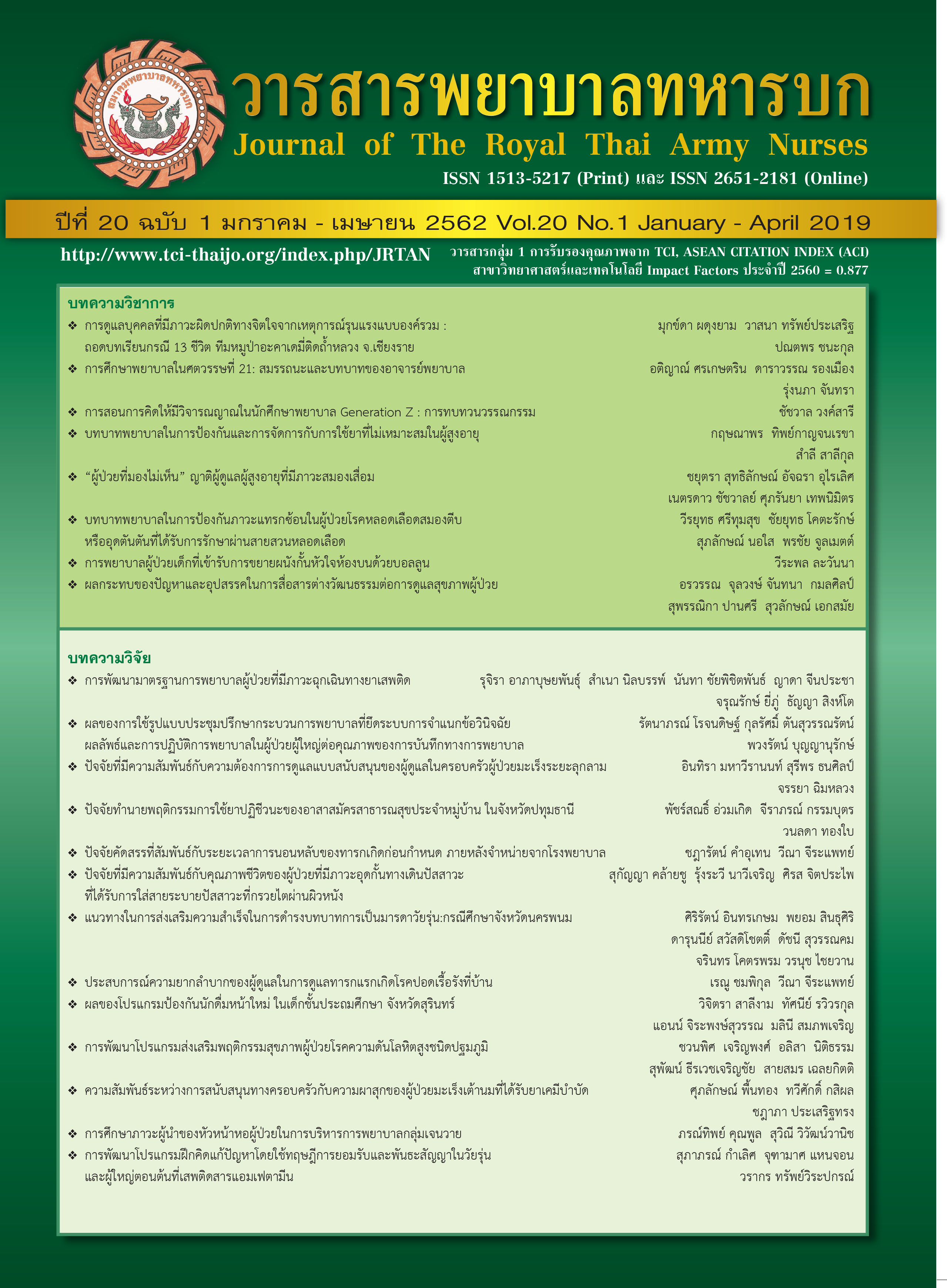“Hidden Patients” Family Caregivers of Elderly People with Dementia
Keywords:
preparation for caring, family caregivers, elderly people with dementiaAbstract
Caring for the elderly people with dementia at home is a burden for family caregivers. The family caregivers have to face the progression of disease that become deteriorated in every day. When the elderly people with dementia are unable to perform daily activities and become more dependent, This situation causes difficulty in taking care of, especially family caregivers who do not have enough knowledge and have never been trained in caring. Moreover, family caregivers may have a physical illness that affects mental health. Therefore, the preparation for the family caregivers to take care of the elderly people with dementia and the caring for the family caregivers need to be provided based on holistic and individual care. When family caregivers are in good health. It will improve the quality of care for the elderly with dementia. This is an essential for the family caregivers who need to provide the best care to the elderly people with dementia in order to maintain good health and quality of life for both.
Downloads
References
Printery limited; 2016. (in Thai)
2. Assantachai P. Common health problems in the elderly and prevention. 4th ed. Bangkok: Union creation limited; 2013. (in Thai)
3. Alzheimer’s Association. 2018 Alzheimer’s Disease Facts and Figures. Alzheimers Dement. 2018;14(3):1-86.
4. Prachuablarp C, Wirojratana V, Jitramontree N, Viriyavejakul A. The Relationships Between Mutuality, Predictability and Caregiver Role Strain in Older Persons With Parkinson’s Disease. Journal of The Royal Thai Army Nurses. 2014;15(3):235-245.
5. White CL, Overbaugh KJ, Pickering CEZ, Piernik-Yoder B, James D, Patel DI, et al. Advancing Care for Family Caregivers of persons with dementia through caregiver and community partnerships. Research Involvement and Engagement. 2018;4(1):1-7.
6. Isaacson R. A Comprehensive Approach to Managing Dementia Patients: Considering theCaregivers. Practical Neurology. 2012:15-17.
7. Vaingankar JA, Chong SA, Abdin E, Picco L, Jeyagurunathan A, Zhang Y, et al. Care participation and burden among informal caregivers of older adults with care needs and associations with dementia. International Psychogeriatrics. 2016;28:221–231.
8. The National Institute on Aging. Alzheimer’s Disease FACT SHEET. NIH Publication No.15-6423. 2015:1-8. 9. Alzheimer’s Association. Alzheimer’s Disease Facts and Figures. Alzheimer’s & Dementia. 2012;8(2):131-168.
10. Kearney FC, Harwood RH, Gladman JR, Lincoln N, Masud T. The Relationship between Executive Function and falls and gait abnormalities in
older adults: A systematic review. Dementia Geriatric Cognitive Disorder. 2013;36(1-2):20-35.
11. Brodaty H, Donkin M. Family caregivers of people with dementia. Dialogues in Clinical Neuroscience. 2009;11(2):217-28.
12. Koskie B, Akers W. The State of Caregiving for Alzheimer’s and Related Dementia 2018. Healthlines. 2018:1-21.
13. Kim MD, Hong SC, Lee CI, Kim SY, Kang IO, Lee SY. Caregiver burden among caregivers of Korean with dementia. Gerontology. 2009;55(1):106-13.
14. Alzheimer’s Association. (2015). Alzheimer’s disease facts and figures. Alzheimer’s & Dementia 2015;11(3):1-83.
15. Department of Thai traditional and Alternative Medicine Ministry of Public Health. The Dementia guide for Hospital Health Promoting Hospital. Bangkok: Beyond Publishing; 2011.(in Thai)
Downloads
Published
How to Cite
Issue
Section
License
บทความหรือข้อคิดเห็นใดใดที่ปรากฏในวารสารพยาบาลทหารบกเป็นวรรณกรรมของผู้เขียน ซึ่งบรรณาธิการหรือสมาคมพยาบาลทหารบก ไม่จำเป็นต้องเห็นด้วย
บทความที่ได้รับการตีพิมพ์เป็นลิขสิทธิ์ของวารสารพยาบาลทหารบก
The ideas and opinions expressed in the Journal of The Royal Thai Army Nurses are those of the authors and not necessarily those
of the editor or Royal Thai Army Nurses Association.






